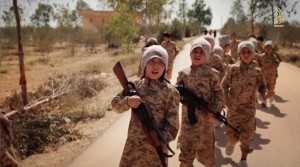The expert warned many had already arrived from the warzone, she said.
In a conference on countering extremism and radicalisation in Nice yesterday, Mrs Especier said: “Twenty-four have returned home from Syria since September. But hundreds of French minors, an estimated 700, are still in the war zone. It is only a matter of time before their parents bring them home.”
Mrs Especier, a member of France’s Inter-ministerial Committee for the Prevention of Delinquency and Radicalisation (CIPD-R), added more than half of the children born to ISIS militants and their wives were “under the age of five” and that more than one-third were “born in ISIS-controlled territory”.
Once home, the children of returnees – babies as young as two months and teenagers as old as 16 – will be taken into care and looked after by local authorities.
But not all ‘ISIS children’ can be sent into foster care, which is what usually happens when a child’s parents are either dead or in jail, she warned.
She said: “We cannot be naïve. Some of these children have witnessed – or even carried out – brutal executions.
“Some are 13 or older, and could eventually face terror-related charges. They cannot live in a foster home.”
But the fate of the ‘children of ISIS’ remains unclear, and deradicalisation officials are racking their brains for solutions to France’s ‘returnee’ problem.
Mrs Especier said: “We are trying to find a solution that suits everyone. Some of the children are very young. We are considering, for example, opening a shelter for the wives of ISIS militants and their children.”
The children, however, cannot be sent to school “immediately,” the deradicalisation expert said.
She said: “Sending the children to school weeks after their return isn’t always possible. These children have been separated from their families, and their mothers are most probably in jail.
“Our aim is to help them feel like children again, and to help them reintegrate back into society.”



